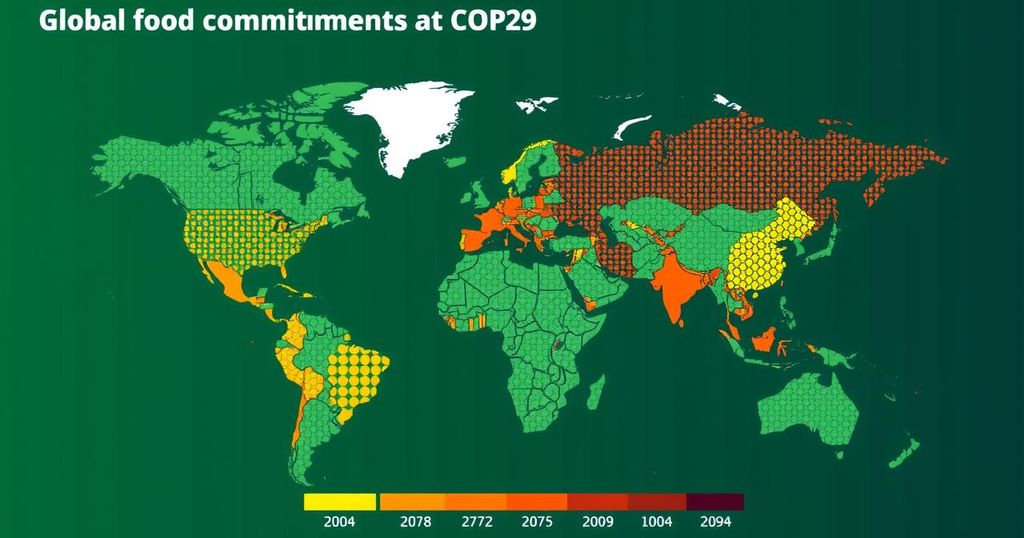The COP29 conference in Baku highlights the significant commitments made to reform food systems in an effort to reduce greenhouse gas emissions. Only a fraction of the 160 nations that signed the UAE Declaration on Sustainable Agriculture have developed actionable national climate plans. Experts stress the necessity of dietary shifts in the Global North to meet climate targets, while financial investments from private entities indicate a collaborative path forward. However, progress remains slow amidst concerns over delayed developments and operational clarity in overarching food systems strategies, demanding immediate attention and reform.
This week, world leaders convene in Baku, Azerbaijan, for the 29th annual United Nations Climate Change Conference (COP29). The previous conference, COP28, marked a significant step in addressing one of the largest sources of greenhouse gas emissions—food systems. Over 100 countries signed a declaration committing to reform their food sectors by 2025. However, despite these promising commitments, many countries remain inactive in integrating agricultural reforms into their national climate strategies. At COP28, a total of 160 nations endorsed the UAE Declaration on Sustainable Agriculture, Resilient Food Systems, and Climate Action, representing a major opportunity to incorporate food systems into national climate plans, known as Nationally Determined Contributions (NDCs). This declaration, if effectively executed, aims to substantially lower food-related emissions, which amount to roughly a third of global emissions, primarily due to meat consumption. Unfortunately, progress remains slow, with only 40 nations on track to revise their NDCs ahead of COP30. This raises questions about the effectiveness of global food pledges and the urgency of dietary changes, particularly in the Global North, where counties like the United Kingdom face challenges in meeting climate targets without addressing meat consumption. Significantly, the agriculture emissions attributed to around 20 Global North countries, including the United States and the United Kingdom, play a critical role in driving global emissions. Experts insist that substantial changes in food production and consumption practices, such as reducing meat intake, are essential for any meaningful impact. Other nations that signed the declaration must follow suit and return to the upcoming conference with tangible goals toward managing food and land use. Financial pledges made at COP28 also highlight the commitment to transform food systems, with contributions exceeding $7 billion from various foundations and corporations, demonstrating the potential for a multifaceted response to the challenge of climate change and food security. Additionally, the UN FAO’s roadmap for food systems, aimed at aligning food security with climate action, remains paramount, though its delayed rollout has sparked criticism from experts concerned about methodological shortcomings and missed opportunities for emissions reduction. Despite these hurdles, one coalition, the Alliance of Champions for Food Systems Transformation, established at last year’s conference, has made headway by fostering collaboration among member countries such as Norway and Brazil to address unique food system challenges. Sierra Leone’s recent initiatives showcase how national reforms can advance food production while preserving environmental integrity. Leaders at the conference must interact with the complexities of integrated global systems, striving for equitable solutions to food systems challenges as they move forward.
The article discusses the ongoing efforts and challenges faced by countries in addressing the climate impact of food systems during the COP29 conference. Climate change conferences have increasingly spotlighted agriculture as a source of greenhouse gas emissions, necessitating synergy between agricultural reforms and climate action plans. With food systems responsible for roughly a third of emissions predominantly from meat production, global cooperation is critical. Past declarations from COP28 highlight commitments made by a significant number of countries to reduce food-related emissions; however, follow-through has proven inadequate thus far. The urgency of dietary shifts, particularly in wealthier nations, is emphasized as essential for achieving climate goals. Furthermore, institutional support, alongside investments from philanthropic entities, plays a pivotal role in catalyzing systemic change while addressing food security concerns.
In summary, COP29 represents a critical juncture in the global effort to harmonize food systems with climate action. Despite substantial pledges and declarations by numerous countries, actual implementation remains sluggish, particularly among key contributors to agricultural emissions. As discussions progress in Baku, there is an urgent need for countries to commit to concrete action and dietary changes, particularly in the Global North, to ensure the success of these food-related climate initiatives and commitments to sustainability. The effectiveness of past agreements and resource investments will be scrutinized as stakeholders seek actionable measures to avert the worsening of climate conditions while ensuring food security for a growing global population.
Original Source: sentientmedia.org






